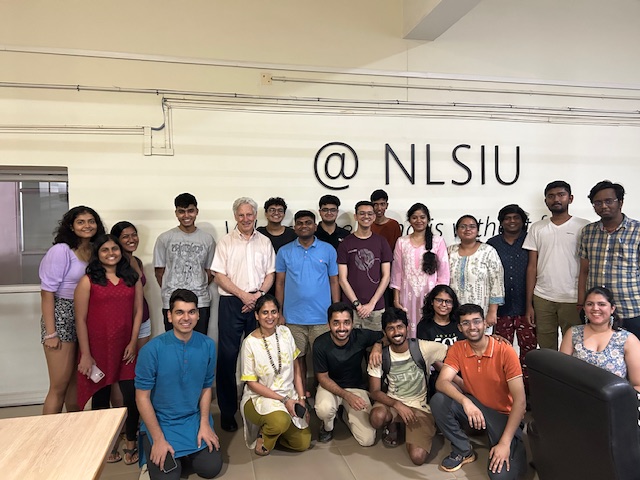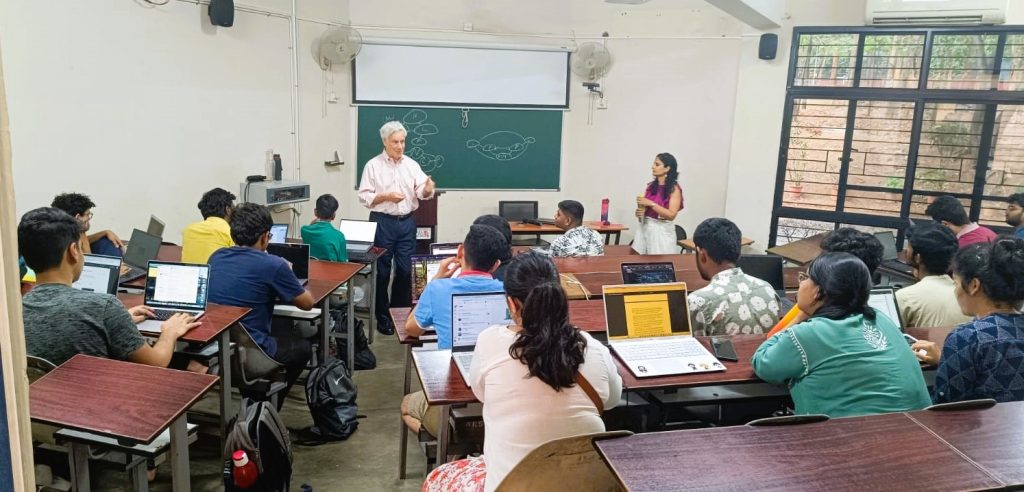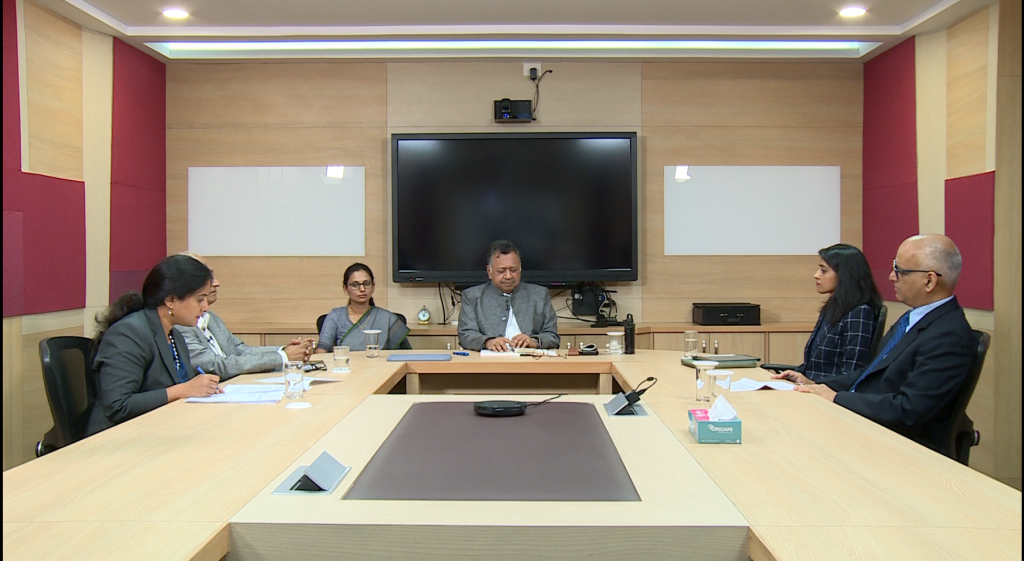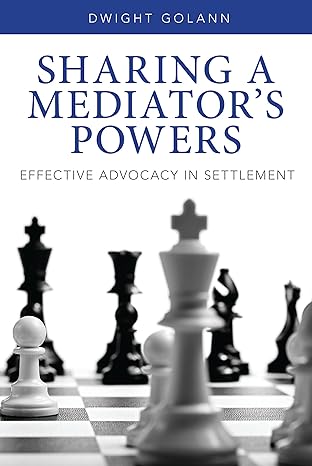Interview with Prof. Dwight Golann | Professor at University of California College of Law, San Francisco, and Suffolk University Law School.
May 7, 2024
We were delighted to host Prof. Dwight Golann, law professor and legal mediator, at the NLS campus for a week during this trimester. Prof. Golann is a Research Professor at the University of California College of Law, San Francisco (UCSF), and Suffolk University Law School. He teaches mediation and negotiation for dispute resolution organizations across the United States and has taught in Europe, Africa, Asia and South America. He is an active mediator who has mediated hundreds of legal disputes. Prof. Golann is Visiting Faculty at NLSIU during the March trimester where he’s teaching an elective course titled Negotiation, Mediation, and Mediation Advocacy Workshop.
In this interview, we asked Prof. Golann to share more about his elective and his experiences during his stay at NLSIU.
Course Background: Recognising that law students in India would benefit from an experiential introduction to mediation advocacy and negotiation, UCSF and CAMP Arbitration & Mediation Practice Private Limited have teamed up to offer this elective for the first time to law students in India. Prof. Dwight Golann is the Lead Instructor while Tara Ollapally from CAMP is assisting him in this course.
 Can you tell us more about your elective course and the practical skills being incorporated into the classroom sessions.
Can you tell us more about your elective course and the practical skills being incorporated into the classroom sessions.
Almost 40 years ago there was a quiet revolution in the American legal system: People became frustrated at the cost and delay involved in litigation and began to look for new ways to deal with legal disputes. One step was to develop better techniques of negotiating, focused on applying objective standards and seeking imaginative solutions, in contrast to the traditional approach of haggling over money. The other was to introduce the idea of having a neutral person, a mediator, help parties overcome the barriers that frustrate legal negotiations. At this point in my city for example, lawyers in half to two thirds of all business and accident disputes voluntarily choose to engage the services of a mediator, at the parties’ expense and with no push from a court. They do this because they have found that mediation is an effective way to resolve cases and retain the loyalty of clients.
The interest in having this type of course at NLS, as I understand it, is that graduates would benefit not only from having a comprehensive knowledge of legal rules and theory, but also from having some of the skills of a practicing lawyer. When it comes to learning a skill, however, the teaching approach must be different. If, for example, you want to become a good basketball player, you can attend talks about basketball and watch games, but unless you get onto a court and handle a ball under the guidance of a good coach, you probably will not become a good player. So here we allow students to practice on a court, so to speak, through role-plays, discussion and critique.
Role-plays in the classroom:
In every class students play the role of a lawyer, party, or mediator. I think the students are finding it interesting. I also find it very interesting to teach this way, because you never quite know what’s going to happen and what the results will be. But if you’re a mediator, you also never know what advocates and parties will do, so it’s both familiar and engaging. I don’t know how unusual spending part of each class role-playing is, but the students seem to take to it. I have also played in role-plays when someone is absent. I don’t know how they feel about negotiating with the professor, but we do it anyway!
A key aspect of every role-play exercise, I should emphasize, is the ability to debrief what has happened, looking at the range of outcomes (put on the board anonymously) and discussing why they differ, what happened in one interaction versus another, and how the principles in the readings played out in practice. I have also filmed professionals performing the same exercises, which allows students to see how someone with years of experience handles the issues they have just confronted.
Since this is your first time on campus, how was it teaching here at NLSIU?
I’ve had the challenge of teaching my students from 8,000 miles away as a face on a screen. That has made it wonderful to be here in person, in the classroom, able to see and get to know the students. They are very active, wanting to describe what happened in their negotiation, why it happened, why they got a result, how difficult litigants and clients are to deal with, and so on. They will have clients who will be just as difficult in their future practice, so it’s useful to have the chance to experience and discuss these issues as part of their training.
One class, for instance, was devoted to how to tell a client about an adverse development in a case without losing their confidence; another was how to deal with “stonewalling” by an opponent – and stonewall effectively when a client demands it. Through this course, we hope to build in the students the skills they will need to negotiate and represent clients in mediation effectively.
I must mention, though, that none of this could have happened without the intervention of NLS faculty member Sahana Ramesh. She has been the indispensable “translator” of American assumptions and requests into the context and culture of NLSIU. Without her tireless willingness to field my requests and resolve misunderstandings, offering this course would have been impossible.
What about your interactions with students on campus?

These are some of the most active class discussions I’ve seen. I pose an issue and immediately five or six hands go up – whom do you pick? I was a little concerned at the beginning when I was only a face on a screen, but my greatest problem now is that there’s not enough time – Too many people want to talk.
For example, in the first class they played a game in which participants had to choose, with very little chance to communicate, whether they would cooperate or compete with a group of other students. As part of the debriefing, I ask for examples of similar behavior in the real world. In America I sometimes get stories like “We agreed that I would clean the refrigerator one week and my roommate would do it the next week; I did it and then he didn’t.” This class includes students who have worked in companies and were able to give sophisticated examples of problems in a marketing team or joint venture. I was quite impressed. And they’ve asked for sessions on new issues such as how to handle advocates who insult them because of their youth or membership in a minority group, and how to get into the field of mediation.
In terms of role-playing in class they seem to do very well. But they always reach agreement; in America, 10-20 per cent fall into impasse. The NLS students thus pass the first test of good negotiation: Can you find a deal within the zone of potential agreement? It does mean, however, that in the mediation role-plays, I have to tell students playing the parties to be unreasonable—to make the mediators “break a sweat”—so they get a real sense of what practice is like.
We heard you are also filming some of the role-plays here for a larger project. Can you tell us more?

Over the past few years, I have filmed mediators in several countries mediate an Indian-American business dispute, with the intent of uncovering differences in how the mediation process works in settings as diverse as Hong Kong, Nairobi, Paris and Boston. I’ve been very interested in learning how an Indian mediator would approach the same dispute, and during this visit I asked Mr. Sriram Panchu, who is referred to as the ‘father of Indian mediation’, if he would be willing to be filmed mediating the case here at NLS. I was sure he would use different techniques, and he did. I was able to observe an exceptional, experienced mediator, who comes with the highest reputation in his field, and was fascinated by subtle differences in how he handled the people and the legal issues, as compared with professionals from other cultures.
I was lucky that NLSIU Registrar Prof. Nigam agreed to play the lawyer for the American company, and Tara Ollapally from the Center for Advanced Mediation Practice in Bangalore arranged for two lawyers and her father to participate in the role play as well. Mr. Panchu asked for someone to play the role of a rogue salesman, and I persuaded a student who had come in to meet with me during office hours to take on the role; he was excellent as a disloyal and later repentant employee. Once I edit hours of film into a concise story, I think we will have an excellent video.
How do you utilise the videos that you film?
Over the years my collaborators and I have filmed dozens of cases and created a video library that we offer without cost to teachers of dispute resolution at www.adrvideo.org. More than 900 teachers have requested access to this library. Organizations have translated the videos into Mandarin, Russian, Turkish and other languages, and they are being used around the world. The University of California-San Francisco Law School will do the same with this video, I think, allowing it to be used at NLS and other universities for teaching purposes. Overall, it’s been a fun and very useful project.
Tell us more about your talk on Alternate Dispute Resolution during this campus visit.
This is an additional lecture that I am delivering to the LLB (Hons) and BA LLB (Hons) students on campus. During his visit, Mr. Panchu talked about the promise of mediation in opening ways for people to identify concerns and develop solutions not available in the court system. I plan to focus on a different issue – that people who negotiate over settlement in legal disputes often feel that they are losing as they bargain. They are better off than if they persisted in court, but they don’t recover what they had before the dispute arose.
This produces one of the most powerful feelings that distorts human decision-making – “loss aversion.” People who feel they are losing make irrational decisions, and over 30 years of mediating the impact of loss has seemed to me to be the largest single reason that negotiations fail.
Interestingly, psychologists describe patients who suffer purely personal losses, such as the death of a loved one, as behaving much like litigants. Sigmund Freud described his patients as working out painful compromises in their minds between their wish to deny a loss and the reality that it had occurred, an internal negotiation that occurs at the same time as the conventional negotiation that parties conduct through lawyers.
I hope to show the students excerpts of a video of my Indian-American dispute and ask them to identify how the Indian CEO and American VP feel they are losing, and how these feelings distort the decision-making. I’ll point out that when someone has these feelings in the middle of a negotiation, they may act like a person who is going through the same stages of grieving as a terminally ill patient—although here it’s the death of a claim or defense rather than a person that is occurring. Parties in this state may become angry and insulting, deny reality, or fail to make decisions at all, acting much like nasty, unethical bargainers. It’s these themes I hope to explore during this session.
 Finally, are there any recommendations for students who are interested in pursuing mediation?
Finally, are there any recommendations for students who are interested in pursuing mediation?
Well, yes, there is a relatively short book. Unfortunately, I wrote it. It’s called Sharing a Mediator’s Powers: Effective Advocacy in Settlement. I think the NLSIU library too has it now. And for negotiation, the best book in my opinion is by a professor at Harvard Business School, Deepak Malhotra, and it is called Negotiation Genius. It focuses on business negotiations and doesn’t deal with court cases, but the lessons Prof. Malhotra offers are applicable and enriched with stories from business executives. I find it much more accessible than an academic text on the theory of negotiation.
Besides these, if there is a way for the University to offer some of the videos we have filmed, I would be happy to share them with NLS.

